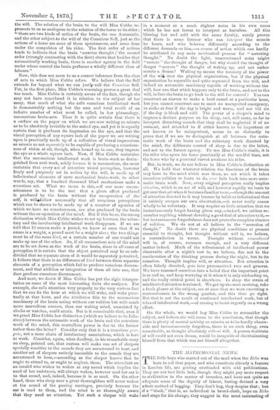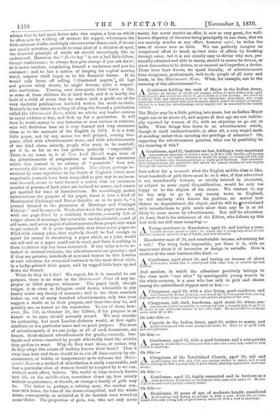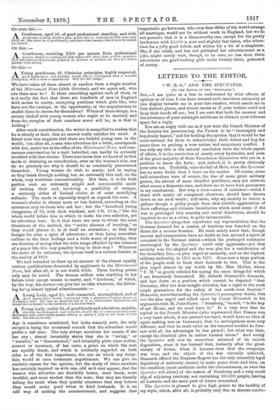THE MA TR/MO-VIAL NE1VS.
rplIE little boys who started out of the mud when the Echo was born to sell that paper, and who constitute already a feature in London life, are getting overloaded with odd publications. They are not bad little lads, though they might pay more respect to civilization in the matter of breeches, and have not quite an adequate sense of the dignity of labour, having devised a very adroit method of begging. They don't beg, they despise that ; but if a "black," that is, an individual in broad-cloth, buys an Echo and stops for his change, they suggest in the most insinuating of whines that he had much better take two copies, a hint on which he often acts by walking off without his copper, whereupon the little salesman winks, exultingly executes a war-dance, and, if we are not utterly mistaken, proceeds to some kind of a division of spoil, the financial principle of which we should exceedingly like to understand. However, the " Eeeho boy" is not a bad little fellow, though troublesome ; he always does give change if you ask for it ; he is never insolent, considering himself a tradesman and you his customer ; and be has a notion of keeping his capital moving which inspires vivid hopes as to his financial future. If he would only leave off selling "illustrated papers,", all legs and garters vilely drawn, he might become quite a respect- able institution. Turning over nine-pence three times a day, as some of these children do, is hard work, and it is hardly the fault of a child of seven that he makes such a profit out of the very doubtful publications included within his stock-in-trade. Recently he has taken to selling all along the Strand a publication called the Matrimonial News, which we advise any reader curious in social oddities to buy, and lock up for a generation. It will then be worth money to any historian or man curious in customs, who will doubtless base on it very learned and very erroneous ideas as to the manners of the English in 1870. It is a very little paper, not by any means too well printed, costing two- pence, filled with advertisements alone, and with advertisements of one kind alone, namely, people who want to be married ; yet it is, as far as we dan gather, perfectly " respectable." There is no trace in it of New jerk Herald ways, none of the advertisements of assignations, or demands for mistresses which that journal in its column of " personals " does not, or recently did not, scruple to publish. The editor, perhaps in- structed by some experience in the North of England, where most respectable journals have been compelled to give way to an inces- sant demand, seems to have formed a notion that an enormous number of persons of both sexes are inclined to marry, and cannot get married for want of introductions. He accordingly ,makes introductions the purpose of his paper, turns it into a kind of Matrimonial Exchange and Barter Gazette, or as he puts it, "a journal devoted to the promotion of Marriage and Conjugal Felicity ;" and he succeeds. Week after week the paper comes out, with one page filled by a rubbishy feuilleton,—usually full of vulgar abuse of marriage, but otherwise unobjectionable,—and of old news, and seven pages of advertisements from people who want to get married. it is quite impossible that these seven pages are filled with clumsy jokes, that anybody should be fool enough to spend his money in circulating a paper which, as a joke, would not sell and as a paper could not be read, and there is nothing in them to attract any but those interested. If any value is to be at- tached to internal evidence, the advertisements are genuine ; and if they are genuine, hundreds of men and women in this London of ours advertise for wives and husbands in the most direct style, in a badly-printed little paper, sold by ragged little boys up and down the Strand.
What do they do it for? We repeat, for it is essential to our purpose, there is no trace in the Matrimonial News of any im- proper or illicit purpose whatever. The paper itself, though vulgar, is as clean as Islington could desire, admissible in any family under any theory of manners ; and in the three numbers before us, out of many hundred advertisements, only two even suggest a doubt as to their purpose, and those two may be, and possibly are, as honest as the remainder. To one of them, how- ever, No. 756, in October 29, the Editor, if his purpose is as honest as he says, should seriously attend. We may mistake its authorship, but most London clubmen would, at first sight, attribute to it a particular name and no good purpose. The mass of advertisements, if we can judge at all of such documents, are honest, thick-skinned advertisements for goods,—namely, hus- bands and wives—inserted by people who really want the articles they profess to want. Why do they want them, or rather, why do they adopt this means of making known their want ? That a stray man here and there should be so cut off from society by cir- cumstances, or habits, or temperament as to welcome the Matri- monial News as a method of introduction is easily conceivable, and that a particular class of women should be tempted by it we can, without much effort, believe. The world at large scarcely knows how life, in the middle-class, sometimes closes up, how utterly without acquaintance, or friends, or change a family of girls may be. The father is, perhaps, a retiring man, the mother con- tent with home, the tone of the house evangelical, and the whole house, consequently, as secluded as if its inmates were vowed to some Order. The proportion of girls, too, who not only never marry, but never receive an offer, is now so very great, the well- known disparity of the sexes being principally in one class, that we can scarcely wonder at any effort, however . marg., to widen the area of chance ever so little. We can perfectly imagine an exceptional effort to break up that state of affairs by breaking through rules; but it is not equally easy to divine why men, pre- sumably educated and able to marry, should in scores be driven, or allow themselves to be driven, to so unusual and imperfect a device. There have been dozens, we speak literally, of advertisements from clergymen, professionals, well-to-do people of all sorts and kinds, in the Matrimonial News. What, for example, can be the meaning of this advertisement ?— AGentleman holding the rank of Major in the Indian Army, having an income of £1,200 per annum, wishes to meet with a lady, aged from 25 to 30, who would not object to go to India in a few months. She must be a lady by birth and education, musical, of an affectionate disposition, who could appreciate a kind husband, with private means, which would be settled on herself. As this is a toed fide advertisement, every inquiry will be accorded to the family solicitor.
The Major may be a little getting into years, but an Indian Major ought not to be above 45, and majors of that age are not habitu- ally rejected by women of 30, with no objection to go out. to India. What brings him down to an advertisement which, though in itself unobjectionable, is, after all, a very stupid mode of avoiding rather than securing the privilege of selection ? Or, supposing the advertisement genuine, what can by possibility be the meaning of this ?
AGeutleman, aged 37, barrister-at-law, holding a very important appointment (upwards of £1,500 a year), in H.3f.'s Civil Service, and having early prospects of yet higher distinction, would be happy to correspond with any lady (not a widow), who would appreciate a really good husband. This advertise- ment being genuine, the advertiser will afford the utmost facility for any inquiry through the agency of solicitors.
Just reflect for a moment what the English middle-class is like, what hundreds of girls there must be in it who, if that advertiser is not unendurably hideous, or utterly tainted in character, or subject to some equal disqualification, would be only too happy to be the objects of his choice. We venture to say he has only to go to any county town in England, to tell anybody who knows his position, no matter how distant an acquaintance, his object, and he will be overwhelmed with introductions to girls much nicer than any he is at all likely to come across by advertisement. But still he advertises. At least, that is the statement of the Editor, who follows up this bait with one still more tempting :—
AYoung merchant in Manchester, aged 24, and having a com- fortable income, wants to settle ; he would like a young lady about 20, fair and nice looking; must be of good family, and well educated.
Manchester man of 24, and comfortable income, advertising for a wife ! The thing looks impossible, yet there it is, with no appearance about it of invention or design to swindle. Here is another of the most business-like kind :-
AGentleman, aged about 50, and having an income of about £000 a-year, would like to correspond with some lady of suitable age and position.
And another, in which the advertiser positively belongs to the class most "run after" by marriageable young women in the whole country, is a man who has only to pick and choose among the embroidered slippers sent to him :- Clergyman, aged 28, with a nice living, good residence, and
well connected, wishes to marry, and would like to correspond with a young lady under 30 years of age, and having some private property of her own.
AClergyman, tall, dark, handsome, aged about 30, whose pre- sent income is £100, would like to correspond with a loveable lady, from 20 to 35 years of age, with some means in her own right. He would like to exchange cartes with 747 or 49L
Or take this:—
ACaptain in the Indian Army, aged 30, wishes to marry, and would correspond with some young lady under 30. Must be of good birth and well educated.
Or this :-
AGentleman, aged 36, with a good business, and a nice private property, would like to correspond with some nice young lady under 30, with a view to marriage.
Or this:—
AClergyman of the Established Church, aged 26, tall and good-looking, but with only .£100 per annum, wishes to marry, and would like to correspond with a young lady of good family, pleasing appearance, and some means.
Or this
AGentleman, aged 35, highly connected and in business.as a wine merchant, would like to correspond with some lady under 30. He has a good income and a private country house.
Or this :-
AGentleman, 29 years of age, of moderate height, considered good-looking, and having an income of E400 a year, would like to corre- spond with some young lady of good family, under 30, with a view to marriage.
lOr even this :_
AGentleman, aged 50, of good professional standing, and with an income of about £1,000 a year, would like to correspond with some lady T.bout 40. She must be of good family, and have some means, which may be settled An herself.
Or this :—
AGentleman, receiving 1300 per annum from professional sources, wishes to correspond with either 0477, 0650, 0750, or 0979; as adver- tiser will have good personal property (at decease of mother), he does not seek a partner with money.
Or this :—
AYoung gentleman, 27, Christian principles, highly respected, good appearance, and healthy, would like to correspond with a sensible young lady, with a view to matrimony. Will No. 821 oblige ?
We have taken all these almost at random from a single number of the Matrimonial News (29th October), and we again ask, who
can these men be ? Is there something against each of them, or is it really the fact that there are hundreds of men in England with means to marry, occupying positions 'which girls like, who have not the courage, or the opportunity, or the acquaintance to enable them to choose for themselves? Which of these things, in a society choked with young women who ought to be married, and from the overplus of their numbers never will be, is it that is lacking ?
After much consideration, the writer is compelled to confess that he is utterly at fault, that no answer really satisfies his mind. A friend near him suggests that there are bashful young men in the world ; but after all, a man who advertises for a bride, corresponds with her, meets her at the office of the Matrimonial News, and com- mences conversation by a tacit betrothal, can hardly be seriously troubled with that disease. There is no harm that we know of in that mode of obtaining an introduction, even on the woman's side, nor do we precisely see why it should be so constantly pronounced immodest. Young women do wish to marry, and in saying .so they break through nothing but an extremely thin and, on the whole, very worthless conventionality. But then, it is for both parties such an extremely stupid and unreasonable mode of seeking their end, involving a possibility of scrapes, a certainty either of limited choice or of most mortifying refusals. The mode is especially stupid as regards the man. A woman's choice is always more or less limited, extending at the 'uttermost only to those who ask her ; but the "beneficed young .clergyman of 30, with dark whiskers, and 5 ft. 10 in.," has the whole world before him in which to make his own selection, yet 'he advertises here. Is it that there are men to whom the mere literalness of the method, the "entire absence of humbug," as they would phrase it, is of itself an attraction ; or that they thunger for even a spice of adventure ; or that, being somewhat callous to the finer feelings and a little weary of partridge, they Are desirous of seeing what the wide range afforded by the columns of a paper like this may possibly bring in their way ? Whatever the cause of its existence, the system itself is a curious feature in the society of 1870.
'We had intended to draw up an account of the almost equally ,curious qualifications demanded by applicants to the Matrimonial News, but after all, it is not worth while. Three leading points only may be noted. The woman seldom asks anything in her future lover except means to marry, and "kindness," of which, by the way, his answer can give her no idea whatever, the follow- ing be;-kg almost typical advertisements:— AYoung Lady, aged 25, well-connected, accomplished, and of good appearance; would correspond with a gentleman having means to .maintain a wife. She has no property, but is of an affectionate disposition, and .would devote herself to the interests of a kind husband.
AYoung Lady, under 25, of good family and education, amiable, cheerful, warm-hearted, and loveable, would like to correspond with some gentleman with comfortable means, willing to marry a lady on the basis of love only. She has no money.
Age is sometimes mentioned, but looks scarcely ever, the only exception being the occasional remark that the advertiser would prefer a tall man. The lady always mentions her means, if she has any ; almost invariably states that she is "loving," or "amiable," or "domesticated," and invariably gives some notion, correct or incorrect, of her caste, a point on which the men are equally frank, and which is evidently regarded on both sides as of the first importance, the one on which any decep- tion would at once terminate negotitiaons. We can give no readable reason for the opinion, but the study of three numbers has certainly inspired us with one, odd as it may appear, that the women who advertise are decidedly better, more frank, more truthful, and more modest than the men ; that they are literally telling the truth when they quietly announce that they believe they would make good wives to kind husbands. It is an odd way of making the announcement, and suggests that respectable go-betweens, who over four-fifths of the world arrange all marriages, would not be without work in England, but we do not perceive that it is a blameworthy one, except for the pretty landowner with 0,000 a year and slightly fast tastes, who adver- tises for a jolly good fellow, and wishes for a bit of a simpleton. She, if she exists, and has not published her advertisement as a joke, might surely wait, though, to be sure, no leas than three advertisers are good-looking girls under twenty-three, possessed of money.




































 Previous page
Previous page